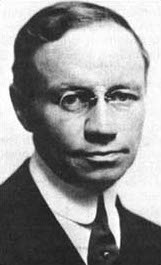A Quote by Alexis de Tocqueville
Consider any individual at any period of his life, and you will always find him preoccupied with fresh plans to increase his comfort. Do not talk to him about the interests and rights of the human race; that little private business of his for the moment absorbs all his thoughts, and he hopes that public disturbances can be put off to some other time.
Related Quotes
I had utterly abandoned myself to Him. Could any choice be as wonderful as His will? Could any place be safer than the center of His will? Did not He assure me by His very presence that His thoughts toward us are good, and not evil? Death to my own plans and desires was almost deliriously delightful. Everything was laid at His nail-scarred feet, life or death, health or illness, appreciation by others or misunderstanding, success or failure as measured by human standards. Only He himself mattered.
These books have not made George nobler or better or more truly wise. It is just that he likes listening to their voices, the one or the other, acording to his mood. He misuses them quite ruthlessly - despite the respectful way he has to talk about them in public - to put him to bed, to take his mind off the hands of the clock, to relax the nagging of his pyloric spasm, to gossip him out of his melancholy, to trigger the conditioned reflexes of his colon.
It is possible that an individual may be successful, largely because he conserves all his powers for individual achievement and does not put any of his energy into the training which will give him the ability to act with others. The individual acts promptly, and we are dazzled by his success while only dimly conscious of the inadequacy of his code.
The opposition is indispensable. A good statesman, like any other sensible human being, always learns more from his opponents than from his fervent supporters. For his supporters will push him to disaster unless his opponents show him where the dangers are. So if he is wise he will often pray to be delivered from his friends, because they will ruin him. But though it hurts, he ought also to pray never to be left without opponents; for they keep him on the path of reason and good sense.
It is not the right of property which is protected, but the right to property. Property, per se, has no rights; but the individual - the man - has three great rights, equally sacred from arbitrary interference: the right to his life, the right to his liberty, the right to his property The three rights are so bound together as to be essentially one right. To give a man his life but to deny him his liberty, is to take from him all that makes his life worth living. To give him his liberty but take from him the property which is the fruit and badge of his liberty is to still leave him a slave.
Weeks passed, and the little Rabbit grew very old and shabby, but the Boy loved him just as much. He loved him so hard that he loved all his whiskers off, and the pink lining to his ears turned grey, and his brown spots faded. He even began to lose his shape, and he scarcely looked like a rabbit any more, except to the Boy. To him he was always beautiful, and that was all that the little Rabbit cared about. He didn't mind how he looked to other people, because the nursery magic had made him Real, and when you are Real shabbiness doesn't matter.
Psychopaths have a grandiose self-structure which demands a scornful and detached devaluation of others, in order to ward off their envy toward the good perceived in other people. He will choose you, disarm you with his words, and control you with his presence. He will delight you with his wit and his plans. He will show you a good time but you will always get the bill. He will smile and deceive you, and he will scare you with his eyes. And when he is through with you, and he will be through with you, he will desert you and take with him your innocence and your pride.
The life-history of the individual is first and foremost an accommodation to the patterns and standards traditionally handed down in his community. From the moment of his birth the customs into which he is born shape his experience and behavior. By the time he can talk, he is the little creature of his culture, and by the time he is grown and able to take part in its activities, its habits are his habits, its beliefs his beliefs, its impossibilities his impossibilities.
The majority of men cannot be made disinterested for life by exhortation, by religious services, by any expenditure of subsidized works, or even by grave and manifest public need. They can be made permanently unselfish only by being helped to become disinterested in their individual purposes. In the complete democracy a man must in some way be made to serve the nation in the very act of contributing to his own individual fulfillment. Not until his personal action is dictated by disinterested motives can there be any such harmony between private and public interests.
A father would do well, as his son grows up, and is capable of it, to talk familiarly with him; nay, ask his advice, and consult with him about those things wherein he has any knowledge or understanding. By this, the father will gain two things, both of great moment. The sooner you treat him as a man, the sooner he will begin to be one; and if you admit him into serious discourses sometimes with you, you will insensibly raise his mind above the usual amusements of youth, and those trifling occupations which it is commonly wasted in.
The idea of racial inferiority or superiority is foreign to me. I can't feel inferior or superior to another man because of race, or in any way antagonistic to him. I judge by the individual, not by his race, and have always done so. I would rather have one of my children marry into a good family of any race than into a bad family of any other race.







































